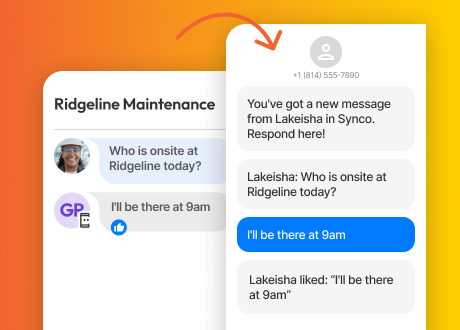As a leader in property management, one of your biggest priorities is creating a positive work environment. Although file management may not immediately come to mind as a critical factor in boosting team morale, the impact of disorganized files goes deeper than you’d expect.
Right now, your team has stacks of records to manage, from leases and rent payments to building incident reports and renovations. Even for the most organized companies, these files are rarely in neat and tidy folders. Instead, they’re scattered all over email inboxes and trapped in endless text message threads.
And while your team may be “getting by” without a streamlined record-keeping system, problems inevitably arise when these crucial records (like photos of unit damage) seemingly vanish into thin air when you need them the most. Disorganized record-keeping jeopardizes sensitive information, drains job satisfaction, and complicates new hire onboarding.
In this post, we’ll demystify record-keeping and reveal how it secretly affects not just employee turnover but also job satisfaction. Then, we’ll show you how to restore order and implement solid record-keeping practices that ensure a smoother operation and prevent such setbacks.
The Ripple Effect of Record-Keeping on Employee Satisfaction
According to Dr. Susan Biali Haas MD’s book The Resilient Life, employee satisfaction is closely tied to their sense of purpose and meaning within an organization. As property management leaders, we often overlook our processes’ profound influence on employees’ daily work and their overall sense of motivation and commitment.
How Processes Impact Company Culture
When communication is slow and processes are scattered, employees struggle to fulfill their roles and feel a sense of accomplishment, making them more likely to leave in search of greener pastures.
For example, a resident moves out, and the property manager needs information from their initial move-in. Now, picture searching through countless emails and text messages for photos from the original move-in inspection. While these tasks can be time-consuming and incredibly frustrating, they’re non-negotiable for getting the job done.
With all of these mounting frustrations, it’s no surprise that attracting and retaining new talent while minimizing staff turnover remains a significant challenge in the property management industry, as highlighted in a 2023 National Apartment Association (NAA) survey.
According to the NAA survey, a positive workplace culture helps address recruiting and retention challenges, causing property management companies to focus on enhancing their internal reputation as much as their external brand image.
The Deeper Impact of Employee Turnover: A Vicious Cycle
Employee turnover isn’t just about personnel changes; it triggers a domino effect of issues. Employees take critical information with them when they leave, setting off a chain reaction of inefficiencies and duplicated work.
Accessing their email after they’ve left is one thing, but tracking down their text messages is pretty much impossible. Even if you gain access to emails, they’re often disorganized and hard to search. All these issues complicate onboarding new employees, leaving them in the dark and questioning their decision to join your company in the first place.
This negative chain reaction also impacts your bottom line. Your time is valuable, and every minute spent on bringing a new property manager up to speed costs you. Time is money, and you don’t want your team wasting theirs searching through outdated email folders or repeatedly asking for information. It just leads to unnecessary expenses.
The Solution – Streamlined Recordkeeping for Property Management Conversations
In property management, disorganization can lead to costly mistakes like misplaced vendor invoices, overlooked maintenance concerns, and even duplicated work. Outdated and disconnected systems are often to blame, highlighting the need for improved organization and efficiency.
The dirty secret of property management communication is that much of the day-to-day work and information sharing is done via text messaging on employees’ personal phones.
Bill Evick, Co-CEO of Synco
The Power of Collaborative Conversations
A centralized platform for recordkeeping and information transfer is one of the biggest needs in property management right now. Synco, a real-time messaging platform for property management, unifies your team, giving them one place to communicate and collaborate.
Smooth Onboarding and Training Empowers New Team Members
Picture the benefits of offering new team members an organized list of property-related conversations. With Synco, you can easily add collaborators to groups and loop in team members to ongoing conversations, providing historical context without starting a new thread. Access to historical information easily searchable by unit, property, or project empowers new hires so they can learn the ropes faster and become productive much sooner.
Real-time Messaging Transforms Property Management Communication
Synco, a real-time messaging platform built for property management, tackles the major recordkeeping challenges that often burden property management teams.
By providing a centralized workspace, Synco ensures that all property-related information is securely stored and easily accessible, alleviating headaches and streamlining operations.
Your team can finally stop worrying about tedious email filing folders because, with Synco, conversations are automatically tagged and organized, even down to the unit level.
Automatically organized recordkeeping and instant communication are no longer “luxuries” for property management companies—it’s a necessity. Don’t let email chaos and employee turnover become a disaster for your business.
Transition to real-time communication and innovative recordkeeping tools to enhance operational efficiency, save time, and provide your team with a smooth onboarding experience. Your journey to a more organized and productive property management future starts now with Synco.



